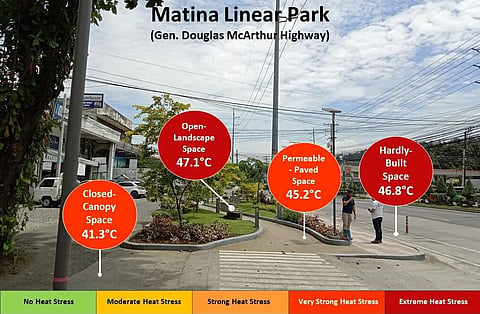Envi group urges city council to craft ordinance to reduce urban heat
A DAVAO City-based environment group advocates for crafting a local green building ordinance to reduce the Urban Heat Island (UHI) effect in highly developed areas.
Interfacing Development Interventions for Sustainability (IDIS), in its Facebook post on Thursday, April 11, 2024, said that in their year-long investigation on UHI from April 2022 to April 2023, they formulated key strategies in lessening heat accumulation in urban areas.
IDIS expressed that crafting an ordinance can promote resilient urban environments for inhabitants and ecology by giving priority to environmentally friendly development methods. It will help the cities of Davao and Tagum mitigate the effect of UHI and improve sustainability and livability.





They outlined several strategic interventions, including creating more green space by planting trees and other vegetation, using low-heat materials like permeable pavements, protecting blue spaces like wetlands, using renewable energy sources like solar and wind energy, and implementing creative urban heat index dissemination systems.
In their study, they discovered that temperatures vary depending on the surface area or material. For hardly built space, they discovered an average temperature of 41.02 degrees Celsius. In comparison, permeable-paved space has an average temperature of 39.33 degrees Celsius, open-landscaped space 38.87 degrees Celsius, and closed-canopy space 33.76 degrees Celsius.
“With their lower heat levels and increased humidity compared to traditional concrete and sparsely populated landscapes, green spaces and permeable pavements have become powerful allies against rising temperatures,” IDIS wrote in the post.
The National Aeronautics and Space Administration (NASA) defines UHI as the occurrence of significantly higher temperatures in a city than in adjacent rural regions. The ability of surfaces in different environments to absorb and retain heat accounts for the temperature difference between urban areas and less developed places.
In a report by the Department of Science and Technology-Philippine Atmospheric, Geophysical and Astronomical Services Administration (DOST-Pagasa) in their El Niño and the Southern Oscillation (ENSO) status, that as of March 20, 2024, the El Niño phenomenon continues to weaken. However, it will likely persist until May 2024. The agency said that it will transition to ENSO neutral state by April to June 2024. RGP

